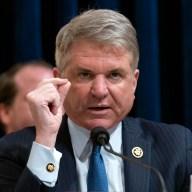Decades ago, a joke about the country’s 34th president went like this: Did you hear about the new Eisenhower doll? Wind it up and it stands still for eight years.
Not so Barack Obama. Today, such a joke would probably involve references to caffeine, hundred-yard dashes and the fast-forward button. Rarely has an American administration sprinted from the starting gate in a manner so vigorous, so sweeping, so sharply different from its predecessor.
Over and over he repeated it as he barnstormed across the land to secure our votes. Change you can believe in. The change we need. Change for America. Change, change, change. On election night, he said this: “Tonight, because of what we did on this day, in this election, at this defining moment, change has come to America.”
A hundred days in, his supporters and detractors probably can agree on one thing: At 1600 Pennsylvania Ave., the change feels nothing less than dizzying.
Everywhere there is change – or, at least, the appearance of it. In bailout techniques and stimulus plans, in terrorism policies, in the tone of foreign affairs and in Obama’s style of communication. Even in the things he eats and the way he walks his new dog.
But wait. Take a breath.
Every new president changes things, particularly one from a different party. Everyone’s already arguing about whether Obama is bringing the change he promised – for good or ill. But is that even the best question to ask so early in his administration?
Consider these questions instead: What does a vague word like change even mean in an America that’s already changing by the nanosecond anyway? And how does a president who promised it in the campaign begin to harness it once he takes office?
–
“The urgent question of our time is whether we can make change our friend and not our enemy.” That’s president Bill Clinton, 1993, first inaugural address. And it’s even truer today. Clinton spoke before Sept. 11, before globalization and the Internet changed everything.
Making change our friend, however, is difficult in a country much more openly divided than it was when Clinton first took office. Quicker than ever in American discourse, one man’s progress is cast as another’s nightmare.
Rush Limbaugh said as much in March, denouncing Obama’s agenda at the Conservative Political Action Conference. “It’s not change and it’s not hope,” Limbaugh said. “All politicians, including President Obama, are temporary stewards of this nation. It is not their task to remake the founding of this country. It is not their task to tear it apart and rebuild it in their image.”
Perhaps. Nevertheless, many people seem inclined to give Obama some space on his change promises, at least for the time being.
In an AP-GfK Poll this month, 54 per cent said it’s too soon to tell if Obama is bringing about the kind of change he promised. Fifty-two per cent of those questioned said he’s changing things about the right amount, at the right speed. But almost one-third said he’s trying to change too many things too quickly.
That sentiment is understandable, says Betsy Skipp, 58, of Miami, a volunteer who represents abused children in the Florida courts. Change is bumpy, she says, particularly if it’s not your kind. “Change should cross party lines,” Skipp says. “But a lot of people in their own personal lives don’t like change. Forget government. They don’t want to move the ashtray because it might disrupt whatever.”
Examining change is a dicey pursuit. The word itself is at once empty vessel, vague mantra and truism.
“Every administration says we’re going to change things. It just becomes a question of what,” says Tim Dixon, a historian at Nova Southeastern University in Florida. “Everybody spouts it, some accomplish. Ask yourself: What can you look at and say, ‘This is different?”‘
Consider just a few of Obama’s changes so far, what he intends to accomplish and how some of his opponents see things.
-Changes in terrorism policies. He’s closing the detention centre at Guantanamo Bay, Cuba, and releasing Bush-era memos that reveal how far the U.S. went with aggressive interrogation techniques. Obama’s interpretation: Let’s fix our mistakes. His opponents’: He’s endangering national security.
-Changes in diplomacy. He’s reaching out to U.S. adversaries – Cuba, Iran, Venezuelan President Hugo Chavez. Obama’s interpretation: We gain strength and respect by communicating. His opponents’: It’s making America look soft.
-Changes in economics. He’s spending more, getting the government more involved in banking, in corporate governance, even, in the case of General Motors Corp., in personnel issues. Obama’s interpretation: Stuff needs to be fixed and we need action. His opponents’: He’s subverting the free market and slouching toward socialism.
-Changes in communication. He encourages debate and dissent. He admits screw-ups, both personal and national – sometimes. Occasionally, he’ll stop and say, simply, I don’t know. Obama’s interpretation: This is how ideas and discourse are encouraged. His opponents’: Look at the squishy, fumbling rookie.
In short, with any kind of change, all interpretations are possible.
“Changing the name of a rose does not make it not a rose,” says A.J. Rutherford, 27, of Enfield, Maine, quoting Shakespeare, sort of. Rutherford, an independent voter and recently laid-off computer systems technician, says he is deeply suspicious of Obama’s brand of change.
Of course, even change itself isn’t politically neutral. Its presence in government traditionally suggests liberalism, its absence conservatism.
“The very fact that there’s more energy in government is, if you’re a certain kind of conservative,” a bad thing on its own, says Evan Cornog, author of “The Power and the Story: How the Crafted Presidential Narrative Has Determined Political Success from George Washington to George W. Bush.”
“You want that kind of sleepy, backwoods government because you don’t think the government should be doing much,” he says.
Nevertheless, he cautions, “People are full of golden ages. … The pretending that things can’t and won’t change is a real recipe for imperial decline. Striking the right balance is the thing.”














